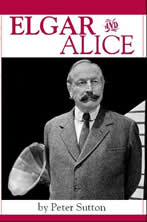|
MUCH SUBTLETY

Peter Sutton's play 'Elgar and Alice',
read by ROBERT ANDERSON
As we all know, officialdom marked the hundred and fiftieth anniversary of Elgar's birth by beheading him from the twenty pound note. Peter Sutton has risked his own head by writing a play that concludes with Lady Elgar a corpse in the composer's arms. He has proceeded on the assumption that the dying reveal their deepest secrets that nothing would have extorted from them in normal health. Alice Elgar's diaries make abundantly clear that from the time of their marriage her own creativity as poet and novelist was at an end. It was submerged entirely in her determination that doubting Edward should become a great composer; and her success was complete.
I was therefore less than convinced when the stage Lady Alice (that was never her title, by the way; and in her world such things mattered) recurred in her illness to the desire that Elgar should set more of her poetry, even urging the Windflower (another spurious Lady Alice) to ensure this after her death. Nor did I feel it right she should reveal so much hurt at the procession of Elgar's Egerias, women whose inspiration she always recognised as essential to his genius and whose friendship she had encouraged.
That said, the portrait of Elgar himself rings wonderfully true. Never at ease with himself, he must have been very difficult to live with, and Peter Sutton points this with much subtlety. From the opening 'Damn!' we are in the maelstrom of Elgar's volatile world, where the quick verbal wit might lacerate as often as it raised a laugh. In the Elgars' private language Bach becomes 'Johann Sebastopol', references to Pomp and Circumstance No 1 include 'Land of Hove and Chorley', 'Pump and Clump', and Ivor Atkins is 'Ivory Hatpins'.

Windflower is right to chide Elgar for much needless unkindness towards Alice, originating in his ever-present sense of social inferiority and subconscious resentment at how much he owed her, not least the Severn House as setting for the play. Without the stiffening of the major-general's daughter, Elgar could have been as feckless as his father, and England would have had to wait even longer for a successor to Purcell. Peter Sutton has doubtless heightened for dramatic ends the domestic tensions as Elgar's earthy humour reacted to Alice's conventional breeding; but they certainly existed.
A very interesting point is Sutton's assumption that Elgar knew he had written himself out in the cello concerto and that no longer could he pluck music from the air around him. Certainly he was quick to recognise that the post-war world, with waitresses in short skirts, ubiquitous jazz and a St Vitus craving for the dance, was inimical to all he stood for, sounds set in order nobilmente. It may be that that famous tune, so admirable a contribution to the war effort, did indeed in Elgar's mind, and in Sutton's telling line, 'knock 'em flat. All the way from Flanders to Gallipoli', leaving Elgar musically void.
I thought finally to have abandoned 'Enigma' solutions, when Peter Sutton supplies what may be the simplest of all. If 'E' stands for Elgar, and 'gma' can be G major, then minimal juggling produces a reference to 'E.D.U.' as Elgar in G major, triumphant resolution of the minor opening to the Variations. Of course Elgar's character and attitudes remain enigmatic, but Sutton is right to end his play with Lady Elgar dead and Windflower on the telephone. Sir Edward's reaction speaks volumes: 'Would you tell her that I can't leave my wife. Because we still have so much to say.'
Copyright © 16 August 2008
Robert Anderson, Cairo, Egypt

Elgar and Alice -
The script of the 150th anniversary play
Peter Sutton
Severnpix, 2008
ISBN13 978-0-9545402-4-1
90 pages, softback |
|

